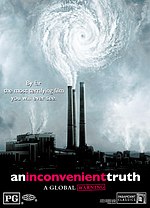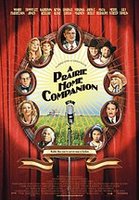AN INCONVENIENT TRUTH
 Director: Davis Guggenheim (Steady TV work, Teach, Gossip)
Director: Davis Guggenheim (Steady TV work, Teach, Gossip)Starring: Documentary "starring" Al Gore
I will categorically state that An Inconvenient Truth is the best Power Point presentation I've ever seen. Of course, that's like saying Betty White was the hottest Golden Girl. She was (sorry Rue McClanahan), but where does that really get us?
Put simply there is no way to review this film on its cinematic merits. It was not a particularly well done film, but neither was it amateurish. It was the result of professionals (but by no means masters ...) filming a seminar on global warming. This was not a great documentary film (see Roger and Me, Crumb, Capturing the Friedmans and more for what great nonfiction film looks like). No, this was a teaching aid on the screen. As such its power lies exclusively in the message. So yeah, I'm going to get off the topic of films and talk science - because, you know, it's kind of important.
Global warming has become politicized (and this movie is marginally politicized as well). Here's the thing though, despite all of the politicians, and talking heads, and blowhards wagging their fingers at the subject, at its core this is entirely a scientific issue. There are hoards of scientists quantitatively analyzing data on the subject, creating hypotheses, discarding failed ones, and progressively testing accepted ones. Science doesn't care if you're republican or democrat. Science didn't care that the Catholic church said that the sun revolved around the earth, or that the earth was 5000 years old and created in 7 days. Science didn't care about these things because its concern is exclusively with evidence, not opinion. Science demands that its practitioners change their opinions if the evidence demands it. It does not change based on the opinions of the practitioner. Yes, it is often times extremely difficult to come to conclusions based on the data, but over time as the pile of data becomes larger and larger it becomes less and less difficult. Believe me, the pile of data on global warming is significant, and growing larger daily.
Greenhouse gas global warming exists. Duh. It's why we're alive. It's why Venus is a thousand degrees warmer than it should be given its distance from the sun. Increased global warming over the past century exists. The evidence is massive. The evidence for global warming caused by man is highly significant. In fact, there are very few scientists who disagree with the liklihood. There are certainly some who disagree with the various flavors of prediction and degrees of causation, but overall the scientific support for this statement is overwhelming. The data is palpable. You'll find few scientists, but a lot of talking heads who disagree with this. Why is that do you think? Why were there few scientists, but a lot of tobacco company executives telling us that cigarettes weren't harmful?
Most layman arguments against man's contribution to global warming come down to broad swipes about the mini-ice age in Europe or previous temperature swings on earth. I want to stress as much as I can, that no scientist anywhere disagrees with the concept that there is natural variation in the earth's temperature. The statistics and data gathered on global warming is precisely to separate the effets of man on this natural background variation. And really, they have significant data showing that it's very likely that we are affecting global temperature.
Here's my personal addition to the argument, though. The concern should be an economic one. When someone has a particularly limited resource (or even a unique one like, say, the earth), shouldn't they be particularly cautious in their use of that resource? If you only have $100000 to live the rest of your life on, would you consider it a good idea to go to Vegas and see if you could double your money? Or would you carefully and soberly determine what you needed to survive, and perhaps use any extra to invest.
The potential monetary costs of a drastically changed environment are massive - trillions and trillions of dollars are potentially at stake. Simple things like moving farm production to new locations costs lots of money. And the effects are so basic to all societies that we can't even predict all of the potential costs (or perhaps even some benefits). Stability is generally good for an economy. Changing the temperature worldwide is not what I would call stability.
In another sense it's like insurance. There is an upfront cost to tackling the global warming issue. I mean, perhaps there is some possibility that your house will not burn down. No intelligent home owner would dare spare the expense to prepare for the worse, however. Taking on the costs associated with halting global warming are large, but hardly overwhelming. The technologies exist right now. And I'm not talking about absurd fantasy notions like making America run on solar power, or other Greenpeace-like silliness. I'm talking about common, tested technologies like automobile gas efficiencies, home heating efficiencies, and appliance and machinery efficiencies.
Oh yeah, I forgot, this was supposed to be a movie review. As a film, this was a particularly average one. But as I said before, this really isn't a film. It's simply a topic. It's a teaching aid. It's a discussion group. For that if you have interest in this topic (and you should, really) you should see the movie. At the least it may inspire you to seriously research reasons why you don't agree with its premise, and more knowledge on the subject can only be a good thing.
Standouts: The topic, because that's all this movie is about.
Blowouts: The cinema, because it doesn't have much. Also a segment that tried to relate global warming to new diseases like SARS and West Nile Virus - that made no sense to me.
Grade: B


